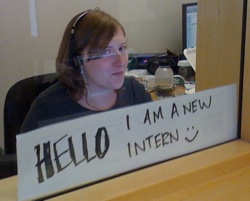 It’s now often possible to walk around Boston without mukluks, so summer can’t be too far off. And that means it’s time to announce the first Nieman Journalism Lab summer internships.
It’s now often possible to walk around Boston without mukluks, so summer can’t be too far off. And that means it’s time to announce the first Nieman Journalism Lab summer internships.
Rather than a traditional full-time internship, we’re trying something a little different. We’re calling it a microinternship. (You can still put “intern” on your resume, though — no need to confuse future employers.)
We hope it’ll give more people a chance to work on the future-of-journalism issues we’re all interested in. Depending on the response we get and some budgetary issues, we’ll have somewhere between two and five microinterns. We’re looking for people who have already some basic reporting chops but who are also already thinking about the changes coming to how we produce and consume news.
Here’s the deal:
— We’ll expect you to write one solid, reported blog post per week. Note the word “reported”; we’re not looking for people to opine. These would be short stories about new journalism startups, attempts at innovation in established news organizations, or interviews with people making a difference in the future of journalism. (Look at the sort of stories Zach does around here for good examples of what I’m talking about.)
— You’ll work with me and the rest of our staff here on deciding what you’d be writing about and on shaping your copy. We’d love it if you had your own great ideas on what to write about; if not, we’ve got a long list of topics we’re interested in and we’re happy to assign.
— If you’re interested, you may also be able to work on other projects around here, like our Twitter feed.
— If you’re based around Boston, then you’re welcome to come down to our office to work. If not, you’d work from wherever you are, on your own schedule.
— In return for your labors, we’ll pay you a little. Not a lot, mind you; don’t expect to pay all your bills from what we’ll be paying. But it might pay your rent if you live somewhere cheap. The idea is that you’d probably do this work in addition to a traditional internship or your regular job.
Note that while internships are traditionally for college students — and I suspect most our applicants will be students — we’re happy to consider working journalists too. If you’re interested in having an opportunity to learn more about new media and online journalism, this could be a great way to do it and get paid (a little).
If you’re interested in applying:
— Send me an email (joshua_benton@harvard.edu) with the subject line “Microinternship application.” In the body, in a few hundred words, tell me why you’d want to be an intern for us and why we should pick you.
— Attach a copy of your resume (PDF preferably, Word or plain text if you must).
— Include links to three journalistic things you’ve done that you’re proud of. These could be news stories, video or audio pieces, blog posts, whatever.
— If you have a blog or some other place where you do something creative online, include links.
The deadline for applying is two weeks from today, May 7, so get cracking.
Photo by Andrew Hitchcock used under a Creative Commons license.